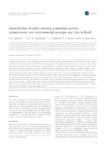Por favor, use este identificador para citar o enlazar este ítem:
http://www.alice.cnptia.embrapa.br/alice/handle/doc/991073Registro completo de metadatos
| Campo DC | Valor | Lengua/Idioma |
|---|---|---|
| dc.contributor.author | LATAWIEC, A. E. | pt_BR |
| dc.contributor.author | STRASSBURG, B. B. N. | pt_BR |
| dc.contributor.author | VALENTIM, J. F. | pt_BR |
| dc.contributor.author | RAMOS, F. | pt_BR |
| dc.contributor.author | PINTO, H. N. A. | pt_BR |
| dc.date.accessioned | 2014-07-21T11:11:11Z | pt_BR |
| dc.date.available | 2014-07-21T11:11:11Z | pt_BR |
| dc.date.created | 2014-07-21 | pt_BR |
| dc.date.issued | 2014 | pt_BR |
| dc.identifier.citation | Animal, v. 8, n. 8, p. 1255-1263, Aug. 2014, | pt_BR |
| dc.identifier.issn | 1751-7311 (impresso) / 1751-732X (online) | pt_BR |
| dc.identifier.uri | http://www.alice.cnptia.embrapa.br/alice/handle/doc/991073 | pt_BR |
| dc.description | Intensification of Brazilian cattle ranching systems has attracted both national and international attention due to its direct relation with Amazon deforestation on the one hand and increasing demand of the global population for meat on the other. Since Brazilian cattle ranching is predominantly pasture-based, we particularly focus on pasture management. We summarize the most recurrent opportunities and risks associated with pasture intensification that are brought up within scientific and political dialogues, and discuss them within the Brazilian context. We argue that sustainable intensification of pasturelands in Brazil is a viable way to increase agricultural output while simultaneously sparing land for nature. Since environmental degradation is often associated with low-yield extensive systems in Brazil, it is possible to obtain higher yields, while reversing degradation, by adopting practices like rotational grazing, incorporation of legumes and integrated crop-livestock-forestry systems. Technical assistance is however essential, particularly for small- and medium-scale farmers. Sound complementary policies and good governance must accompany these measures so that a 'rebound effect' does not lead to increased deforestation and other adverse social and environmental impacts. It is also important that animal welfare is not compromised. Although the discussion is presented with respect to Brazil, some aspects are relevant to other developing countries. | pt_BR |
| dc.language.iso | eng | eng |
| dc.rights | openAccess | eng |
| dc.subject | Planificación del uso de tierras | pt_BR |
| dc.subject | Agricultura sustentable | pt_BR |
| dc.title | Intensification of cattle ranching production systems: socioeconomic and environmental synergies and risks in Brazil. | pt_BR |
| dc.type | Artigo de periódico | pt_BR |
| dc.date.updated | 2019-01-10T11:11:11Z | pt_BR |
| dc.subject.thesagro | Uso da terra | pt_BR |
| dc.subject.thesagro | Indústria pecuária | pt_BR |
| dc.subject.thesagro | Agricultura sustentável | pt_BR |
| dc.subject.thesagro | Produção agrícola | pt_BR |
| dc.subject.nalthesaurus | Land use planning | pt_BR |
| dc.subject.nalthesaurus | Sustainable agriculture | pt_BR |
| riaa.ainfo.id | 991073 | pt_BR |
| riaa.ainfo.lastupdate | 2019-01-10 -02:00:00 | pt_BR |
| dc.identifier.doi | 10.1017/S1751731114001566 | pt_BR |
| dc.contributor.institution | International Institute for Sustainability/Opole University of Technology/School of Environmental Science; International Institute for Sustainability/Pontificia Universidade Catolica; JUDSON FERREIRA VALENTIM, CPAF-AC; Agrosuisse; International Institute for Sustainability. | pt_BR |
| Aparece en las colecciones: | Artigo em periódico indexado (CPAF-AC)  | |
Ficheros en este ítem:
| Fichero | Descripción | Tamaño | Formato | |
|---|---|---|---|---|
| 25100.pdf | 148,28 kB | Adobe PDF |  Visualizar/Abrir |









